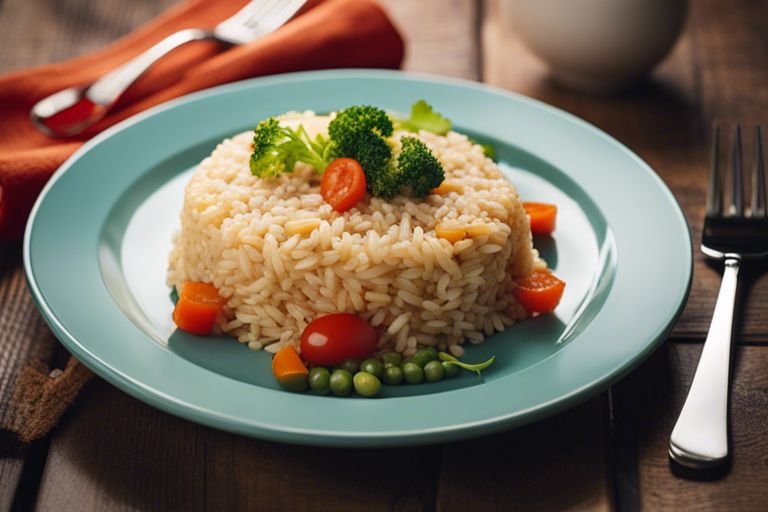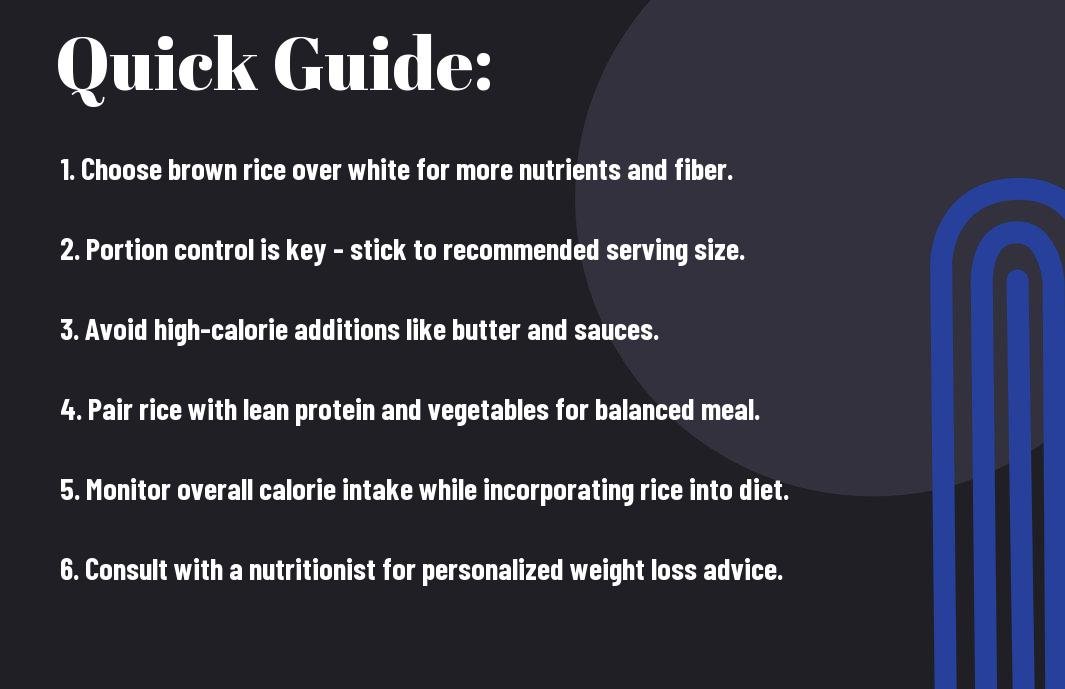Is Rice Healthy for Weight Loss? The Surprising Truth Revealed
- Home
- Is Rice Healthy for Weight Loss? The Surprising Truth Revealed

Is Rice Healthy for Weight Loss? The Surprising Truth Revealed
Conventional wisdom would have you believe that rice is a no-go for anyone trying to shed pounds, but the reality is far more nuanced. As someone who has extensively researched the topic, I can confidently say that yes, rice can actually be a healthy addition to your weight loss journey. However, the key lies in choosing the right type of rice and controlling your portion sizes. In this guide, I will explore the benefits of incorporating rice into your diet, as well as the potential pitfalls to avoid. By the end, you’ll have a clearer understanding of how rice can fit into your weight loss strategy, and you may be surprised by what you learn!
Key Takeaways:
- Rice can be part of a healthy weight loss diet: While high in carbs, rice can still be included in a weight loss plan when consumed in moderation and as part of a balanced diet.
- Choose the right type of rice: Opt for brown rice or wild rice over white rice for their higher fiber and nutrient content, which can aid in weight loss and overall health.
- Be mindful of portion sizes: Controlling portion sizes is crucial when incorporating rice into a weight loss plan, as excessive consumption can hinder progress.
- Pair rice with lean protein and vegetables: Balancing rice with lean sources of protein and fiber-rich vegetables can help create a satisfying and nutritious meal that supports weight loss goals.
- Consider individual dietary needs: While rice can be a healthy choice for some, those with specific dietary restrictions or sensitivities may need to adjust their intake or choose alternative grains for weight loss.
Types of Rice
The varieties of rice available in the market are plentiful, each with its own unique flavor, texture, and nutritional profile. There is white rice, brown rice, wild rice, and many other varieties to choose from. The choice of rice can have an impact on your weight loss journey.
| White Rice | Mostly consists of carbohydrates |
| Brown Rice | Rich in fiber and nutrients |
| Wild Rice | High in protein and antioxidants |
| Basmati Rice | Low in calories and glycemic index |
| Jasmine Rice | Contains essential minerals like manganese and copper |
White Rice
White rice has been stripped of its husk, bran, and germ, resulting in a loss of fiber and nutrients. The refining process leaves mainly carbohydrates in the form of starch, which can lead to rapid spikes in blood sugar levels, making it less ideal for weight loss compared to other varieties.
Brown Rice
Brown rice, on the other hand, retains its fiber and nutrients due to the presence of the bran and germ. This makes it a better choice for weight loss as the fiber content helps keep you feeling full for longer, reducing the likelihood of overeating.
Wild Rice
Wild rice is not actually rice but a type of aquatic grass seed. It is high in protein and antioxidants. The protein content makes it a great addition to a weight loss diet as it helps in building and repairing body tissues, while the antioxidants help in combating free radicals that can lead to cell damage.
Tips for Incorporating Rice into a Weight Loss Diet
While some may believe that rice is not an ideal food for weight loss, I can assure you that it is possible to enjoy rice as part of a healthy eating plan. Here are some tips for incorporating rice into your weight loss diet:
- Opt for brown rice or wild rice instead of white rice, as they are higher in fiber and nutrients.
- Measure your portions to control calorie intake – one serving of rice is about the size of a tennis ball.
- Pair rice with lean proteins and abundant vegetables to create balanced, nutrient-rich meals.
- Experiment with healthy cooking methods to prepare rice, such as steaming, boiling or using a rice cooker.
- Be mindful of portion control, as overeating rice can lead to excess calorie consumption.
After incorporating these tips, you will find that rice can be a nutritious and satisfying addition to your weight loss diet.
Portion Control
When it comes to including rice in your weight loss diet, portion control is key. While rice can be a healthy carbohydrate option, it’s important to be mindful of the serving size. Measuring out your portions can help you manage your calorie intake and prevent overeating. The recommended serving size for rice is about the size of a tennis ball, or approximately ½ cup of cooked rice. By sticking to this portion size, you can enjoy the benefits of rice without consuming excess calories.
Choosing Healthy Cooking Methods
When preparing rice as part of a weight loss diet, choosing healthy cooking methods is essential. Avoid frying or adding excessive fats to your rice dishes, as this can significantly increase the calorie content. Instead, opt for healthier cooking methods such as steaming, boiling, or using a rice cooker. These methods help preserve the nutritional value of the rice and prevent the addition of unnecessary calories from cooking oils or fats.
Pairing Rice with Protein and Vegetables
An effective way to incorporate rice into a weight loss diet is by pairing it with protein and vegetables. This not only enhances the nutritional value of your meal but also helps create a balanced and satisfying dish. Lean proteins such as chicken, fish, or tofu can provide essential nutrients while vegetables add fiber and a variety of vitamins and minerals. By combining rice with protein and vegetables, you can create nutrient-rich meals that support your weight loss efforts.
Step-by-Step Guide to Using Rice for Weight Loss
Keep in mind that not all rice varieties are created equal when it comes to weight loss. Brown rice, wild rice, and black rice are considered to be the healthiest options due to their higher fiber and nutrient content compared to white rice. Here’s a step-by-step guide to using rice for weight loss:
| Step 1 | Choose the right type of rice |
|---|---|
| I recommend opting for brown, wild, or black rice. | |
| Step 2 | Plan your meals |
| Meals with a balance of lean protein, healthy fats, and plenty of vegetables paired with a modest portion of rice will aid in weight loss. | |
| Step 3 | Monitor portion sizes |
| Be mindful of your rice portion sizes to avoid consuming excess calories. | |
| Step 4 | Track your progress |
| Keep a food journal to monitor your rice intake and its impact on your weight loss journey. |
Planning Meals with Rice
When planning your meals with rice for weight loss, it’s crucial to incorporate a variety of nutrient-dense foods alongside your chosen rice variety. By balancing your meals with lean protein, healthy fats, and an abundance of colorful vegetables, you’ll create a well-rounded and satisfying meal that supports weight loss.
Monitoring Portion Sizes
Maintaining appropriate portion sizes of rice is essential for weight loss. While rice can be a healthy addition to your diet, too much can lead to unnecessary calorie consumption. Be mindful of your portion sizes to avoid overeating and to stay on track with your weight loss goals.
Tracking Progress
Tracking your progress is a vital component of using rice for weight loss. By keeping a food journal and monitoring your rice intake, you can gain valuable insights into how it impacts your weight loss journey. This will help you make informed decisions and adjustments to your diet as needed.
Factors to Consider When Including Rice in a Weight Loss Plan
Unlike popular belief, including rice in your weight loss plan can be a healthy choice when done mindfully. Here are a few factors to consider when incorporating rice into your diet:
- Nutritional Content – Before including rice in your weight loss plan, it’s crucial to consider its nutritional content. While rice is a good source of carbohydrates, it also contains essential nutrients such as fiber, vitamins, and minerals.
- Glycemic Index – The glycemic index measures how quickly a food raises blood sugar levels. Some types of rice, like white rice, have a high glycemic index, which can lead to spikes in blood sugar levels. However, brown rice and wild rice have a lower glycemic index and can be a better choice for weight loss.
- Allergies and Sensitivities – It’s important to be aware of any allergies or sensitivities you may have to rice. Some people may experience digestive issues or an allergic reaction to rice, so it’s essential to listen to your body and choose the right type of rice for your needs.
Though these factors are important to consider, with mindful planning and proper portion control, rice can indeed be a healthy addition to your weight loss journey.
Nutritional Content
When it comes to the nutritional content of rice, it’s essential to choose the right type. While white rice may lack certain nutrients due to the refining process, brown rice and wild rice offer more fiber, vitamins, and minerals. By choosing whole grain options, you can make a healthier choice for your weight loss plan.
Glycemic Index
The glycemic index of rice can vary depending on the type. While white rice has a high glycemic index, leading to rapid spikes in blood sugar levels, brown rice and wild rice have a lower glycemic index, making them a better choice for managing blood sugar and weight loss. Choosing these options can help keep your blood sugar levels steady and aid in your weight loss efforts.
Allergies and Sensitivities
It’s important to be mindful of any allergies or sensitivities you may have to rice. Some individuals may experience digestive discomfort or allergic reactions to rice, so it’s crucial to pay attention to your body’s response. Additionally, some people may be sensitive to certain types of rice, such as glutinous rice. Being aware of your body’s reactions and choosing the right type of rice for your needs is essential for a successful weight loss plan.
Pros and Cons of Using Rice for Weight Loss
Despite being a staple in many diets around the world, rice has both benefits and drawbacks when it comes to using it for weight loss. It’s important to weigh both the pros and cons before adding rice to your diet.
| Pros | Cons |
| High in carbohydrates for energy | High in calories |
| Contains essential nutrients like iron and B vitamins | May cause blood sugar spikes |
| Can be filling and satisfying | Some types may have high arsenic levels |
| Can be a versatile ingredient in various dishes | May contribute to digestive issues in some people |
| May aid in digestion and bowel regularity | May contain gluten (in some varieties) |
Benefits of Rice Consumption
Rice consumption can provide a good source of carbohydrates for energy and essential nutrients such as iron and B vitamins. Additionally, it can be a satisfying and versatile ingredient for a variety of dishes.
Drawbacks of Including Rice in a Weight Loss Plan
It’s important to be aware that rice is high in calories and may lead to blood sugar spikes. Additionally, some types of rice may contain high levels of arsenic and contribute to digestive issues in certain individuals. It’s also worth noting that rice can contain gluten, which can be a drawback for those with gluten sensitivities.
I hope this information helps you make an informed decision about whether to include rice in your weight loss plan. Remember to consider the pros and cons and choose the type and portion size of rice that best fits your nutritional and weight loss goals.

Is Rice Healthy for Weight Loss? The Surprising Truth Revealed
Following this exploration of the impact of rice on weight loss, it’s clear that rice can be a healthy and nutritious addition to your diet when consumed in moderation. It provides essential nutrients and can help you feel satisfied, making it easier to stick to your weight loss goals. However, the key is to pay attention to portion sizes and choose whole grain options over refined white rice to maximize the health benefits. With a balanced and mindful approach, including rice in your diet can be part of a successful weight loss journey.
FAQ
Q: Is rice healthy for weight loss?
A: Yes, rice can be a healthy part of a weight loss diet. It is a good source of carbohydrates and energy, and when eaten in moderation, can help you feel full and satisfied. However, portion control is key, and choosing whole grain or brown rice over white rice is recommended.
Q: Can I eat rice if I’m trying to lose weight?
A: Absolutely. Rice can be a part of a weight loss diet when consumed in reasonable portions. It’s important to consider the type of rice and how it’s prepared. Opt for brown rice or wild rice for added nutrients and fiber, and avoid adding high-calorie toppings or sauces.
Q: What are the benefits of eating rice for weight loss?
A: Rice is a good source of complex carbohydrates, which can provide sustained energy throughout the day. It can also help prevent overeating by keeping you feeling full. Additionally, certain types of rice, such as brown rice, contain important nutrients like fiber, vitamins, and minerals which are beneficial for overall health and weight management.
Q: Are there any downsides to including rice in a weight loss diet?
A: While rice can be part of a healthy weight loss plan, overconsumption or choosing highly processed white rice can lead to weight gain. Additionally, adding high-calorie toppings or consuming large portions can sabotage weight loss efforts. It’s important to be mindful of portion sizes and choose whole grain varieties for the most nutritional benefits.
Q: How should I incorporate rice into a weight loss meal plan?
A: To include rice in a weight loss meal plan, start by measuring your portions. Choose whole grain or brown rice for added fiber and nutrients, and pair it with lean proteins and plenty of vegetables for a well-rounded, satisfying meal. Be mindful of added fats and sauces, and aim to create balanced, portion-controlled meals to support your weight loss goals. Remember, moderation is key.
- Share
Mark Twain
Mark Twain stands at the helm of Create More Flow, infusing every sentence with the wisdom of his 15-year expeience through the seas of SEO and content creation. A former BBC Writer, Mark has a knack for weaving simplicity and clarity into a tapestry of engaging narratives. In the realm of content, he is both a guardian and a guide, helping words find their flow and stories find their homes in the hearts of readers. Mark's approach is grounded in the belief that the best content feels like a chat with an old friend: warm, inviting, and always memorable. Let Mark's expertise light up your website with content that's as friendly to Google as it is to your audience. Each word is chosen with care, each sentence crafted with skill - all to give your message the human touch that both readers and search engines love.
